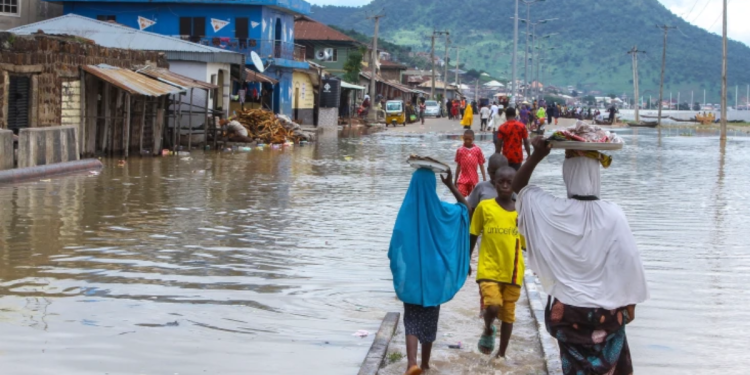Despite being hit by a flood in 2022, several states failed to embark on flood and erosion control-related projects in the first quarter of 2023. Dataphyte’s review of Nigerian states’ Q1 2023 budget implementation reports showed.
Oluwaseyi Ebenezer, the team lead of Triple Green Environmental Development Foundation (TGED Foundation), an environmental not-for-profit organisation that focuses on enhancing a sustainable environment, told Dataphyte that the zero performance by states on flood and erosion control indicates a lack of preparedness to mitigate the 2022 occurrence.
In 2022, Nigeria experienced what was described as its worst floods. A look at the official website of the National Emergency Management Agency (NEMA) showed that all 36 states in the country and the Federal Capital Territory (FCT) were affected, with varying degrees of damages reported.
Across the 36 states and FCT, a total of 4.47 million persons were affected by the floods, with 665 deaths reported. Over 3,000 persons were injured as a result of the flood.
-1707321188.webp)
Source: NEMA
Beyond these, several houses and farmland were destroyed, either totally or partially.
The total direct economic damages caused by the flood in monetary terms were estimated between $3.79 billion to $9.12 billion by the Nigerian Minister of Humanitarian Affairs, Disaster Management and Social Development, Sadiya Umar Farouq.
With these damages, it was hoped that governments at the federal and subnational levels would make provisions for flood and erosion control in their 2023 budget to at least mitigate such devastating occurrences again.
Indeed, several states earmarked flood and erosion control funds in their 2023 budget. However, Dataphyte’s review of the Budget Implementation Report (BIR) of many states showed that several of them did not embark on any flood and erosion control project in the first quarter of the year.
Many states recorded zero implementation on their flood and erosion control budget. This raises concerns about their preparedness for yet another flood predicted to happen this year.
A review of the 36 states’ 2023 budgets showed that all, except 9 states, earmarked funds for flood and erosion control.
Out of the states that budgeted for flood and erosion control, Oyo State had the highest budget of N16.29 billion. Bayelsa State follows this with N10.65 billion. Nasarawa, Niger, and Edo budgeted at least N2 billion for flood and erosion control in their 2023 budget.
.webp)
However, Jigawa State, which the Minister of Humanitarian Affairs, Disaster Management and Social Development, Sadiya Umar Farouq, said was the worst hit by the 2022 flood, is not among the top 5 states with the highest budgetary allocation for flood and erosion control.
On the bottom of the table (states that budgeted the least amount in their 2023 budget for flood and erosion control) are Ebonyi, Enugu, Ekiti, Kwara, and Kogi States.
All the same, when the emphasis is on the implementation of the flood control budget, Delta State leads others.
At the end of Q1, the state had recorded a 58.21% performance of its annual flood and erosion control budget, indicating some level of preparedness ahead of the flood predicted to happen later this year.
.webp)
Abia State, as of the end of Q1, has implemented 32.84% of its budget for flood and erosion control. Jigawa and Ekiti States followed with above 20% performance.
Edo State had the lowest performance in the first quarter, followed by Bayelsa State.
It is important to state that Rivers and Sokoto States budgeted for flood and erosion control in 2023, but as of the time of the publication of this report, their BIR for Q1 wasn’t published. Thus, we could not assess their budget performance on this.
For the other 18 states in the table above, though they made provision for flood and erosion control in their 2023 respective budgets, there was zero implementation of the budget in the first quarter of the year. Thus, raising questions about their level of preparedness to mitigate the effects of another flood that the NEMA had warned would happen this year.
Also, apart from these 18 states that recorded zero implementation of their flood and erosion control budget in the first quarter, 9 states did not make any provision for flood and erosion control in their 2023 budget, even though they were among the states that were affected by the flood incidents in 2022.
The 9 states are Akwa-Ibom, Katsina, Kebbi, Lagos, Ogun, Ondo, Osun, Plateau, and Yobe States.
Meanwhile, several reports have indicated that Nigeria will experience severe flooding later this year.
The seasonal climate predictions and annual flood outlook released by the Nigerian Meteorological Agency (NiMet) and the Nigeria Hydrological Services Agency (NIHSA) showed that there would be massive floods.
The Director-General of NIHSA, Clement Nze, noted that from their prediction, 178 Local Government Areas (LGAs) in 32 states and the FCT would experience severe flooding in 2023. Thus, advised states and other relevant authorities to take early action to avert any disasters.
However, from the review of states’ Q1 budget performance reports, particularly on flood and erosion control, it appears that many states are unprepared, as there was no implementation of any sort in the first quarter of the year.
Oluwaseyi Ebenezer, an environmentalist, stressed this during a chat with Dataphyte. According to her, the state that is yet to start any form of implementation of its budget on erosion and flood control leaves its state and citizens at high risk, especially as NEMA had warned that the flood this year would be severe.
She advised states to start taking proactive measures in issues like this to avert certain losses and damages rather than wait until such a disaster happens before they take action.



-1707321188.webp)
.webp)
.webp)